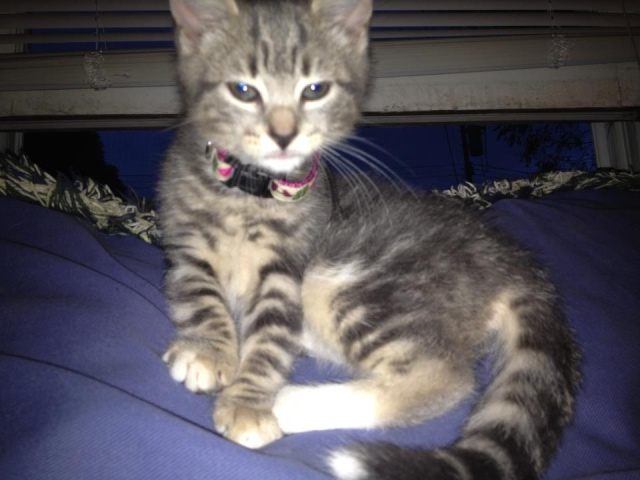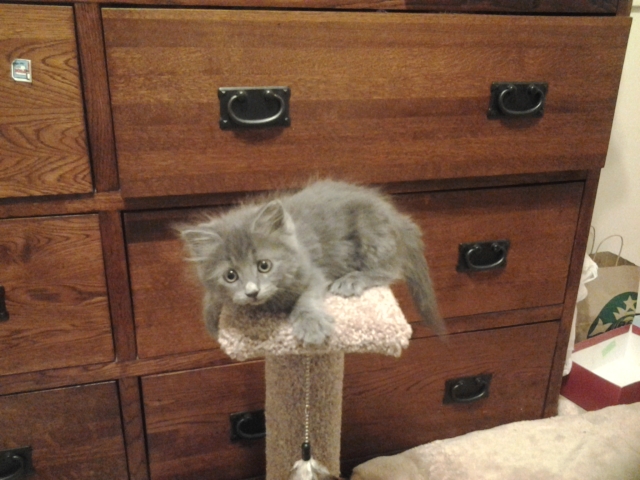QuestionQUESTION: I have five 6 month-old feral kittens for whom I need advice on what to do about them. I did TNR on them at 3 months (with their mom). I tried to tame them while outside which has resulted now in their moving into my backyard (garage, screened deck room and/or feral cat houses) where they play and live and I feed them. Their mother left them at 4 months and they respond very strongly to me. 2 will lick baby food from my fingers. But none allow me to touch them. I live in Minnesota and during a cold 2 weeks ago I let them into my laundry room. Now they like coming in for the night. I already have 4 indoor cats, one of whom is a house feral himself. (He does not let me touch him either so I have had to have him netted when I need to get him health care). The kittens are infatuated with my house feral Sam but he seems annoyed by them. My other cats seem to tolerate the kitten's presence. I have a way for them to come in and out the screened deck room without my other cats being able to go out. When they were neutered/spayed they also got rabies shots but nothing else, though the mother was tested and shown to be negative for FeLV and FIV. I feel torn- do I trap them again to get the rest of their vaccines done? Do I try to force them to be outside-only cats, even though I have already semi-tamed them and the winter here will get dangerously cold in not too long? I am not too hopeful about fully taming them further. Any advice or suggestions? have I done something really wrong in trying to tame them but not being able to do it fully?
ANSWER: Miriam,
I can't really tell you for sure what (if anything) you've done wrong in the course of taming these semi-feral cats since you've not provided me with much information on your process. Maybe if you'd be so kind as to provide me with a step by step description of the attempts that you've made towards taming your older kitty and these kittens I might be able to offer you some hints to help bring them around further which might allow you to find permanent, loving homes for them and you might possibly be able to have the older cat's rehabilitation process move forward as well. Generally I use a multi-faceted approach to tame feral cats/kittens and or deal with cats who are exceptionally fearful of people in general for any number of reasons. Now it's important to realize that if you aren't prepared to take the time and patience or make a complete commitment to working with Sam and these babies I'd be wasting your time and mine by providing extensive information about getting them on a more domesticated track. Since you do live in a temperate climate and winter does get cold I don't see a need to force any of these cats to live an outdoor only existance, in fact I suspect that by making that choice for them it's possible you may lose one or more of these babies over the course of the winter even with proper feeding and makeshift shelters.
There are a number of really positive signs with these babies that indicate that you may simply be in need of a few extra tips to really help get them on their road to rehabilitation and possibly even loving, permanent adoptive homes. These babies are already leaps and bounds beyond most ferals - they're willing to come indoors and tolerate the presence of people, a couple of them are willing to take food directly from your hands and that's a hugely positive sign, especially when you consider the fact that I am well acquainted with a number of regular, tame house cats who wouldn't entertain the idea of eating from their human caregiver's hand. These babies are fairly young, relatively habituated to people and even though they're still somewhat cagey around people I don't think that they're hopeless cases for rehabilitation - for that matter I think that it's possible to change even Sam's outlook and get him to a point where he's more comfortable being handled (I'd never promise you a lap cat, but I think we can at least get him to the point where he can be handled for routine medical care and occasionally receive human affection in the form of some scratches behind the ears, under the chin or in another favorite feline spot isn't unreasonable with time, patience, a few tips/tricks, some unconventional approaches and a strong commitment to getting these guys where they need to be psychologically and emotionally). Contrary to popular belief it is possible to tame even adult feral cats, it just takes more time, energy, commitment, patience and persistance than it would to tame very young kittens. Many articles that I've found online are disappointing when it comes to properly guiding pet parents through the process of gaining a feral cat/kitten's trust and using that newfound trust to tame them, in fact the majority of published material I've read essentially says that it's of no use to bother trying to tame a feral kitty that's any older than 6-8 weeks of age. In my experience it takes several techniques and approaches coming together to create the perfect environment for working with feral/semi-feral kitties of any age, but if you really want these guys to become suitable as pets (for your household or for new adoptive families) then I'd be more than happy to help you out to the best of my ability for as long as you need my help.
***Be forewarned, the allexperts site will sometimes tell you that you've asked too many follow up questions, if this happens to you then simply go back and contact me again the same way you did initially and provided that I haven't been asked my quota of questions for that day you should be able to get ahold of me.***
To be honest, I don't think you've done anything wrong per se when it comes to taming these guys and having them get only to a certain point, I think that there's a lack of good solid material out there that offer constructive, useful advice to help cat lovers with varying amounts of experience help feral/semi-feral or fearful cats coming from a variety of situations. I believe that you truly love these cats and you want to do what's best for them and it's clear that you've already put an inordinate amount of time, love, patience and work into trying to bring Sam and this latest batch of kittens around to a point where they could be called fully tame and I believe that it's a question of needing someone with different experiences and approaches to fill in the blanks to help you get these guys the rest of the way down the road you've started helping them down. As I said before I can't promise you that these cats are ever going to be 100% mush ball lap cats, but I think that it's within reasonable reach to have them become more comfortable around people and allow themselves to be handled. It's truly amazing to see a kitty who was so fearful of people previously turn around and become comfortable and willing to be handled and I'd like to help you accomplish that incredible sense of accomplishment.
I think that my help in your situation will be quite simply a matter of pointing out areas where there are other tricks and techniques you may not have known about or tried. Sometimes as cat lovers we can be our own worst enemies when it comes to trying to get through to a fearful kitty. It's human nature to behave very differently than a cat normally would meaning that when they're frightened we'll do things like speak to them or make eye contact in an attempt to reassure them and convince them that they'll be okay - in reality for a fearful cat those simple oversights on our part can lead to increased fear which defeats the purpose of our efforts. Cats are very different from people, they tend to be much more subtle than we are in terms of assessing body language. While people and other animals rely heavily on eye contact and voice as a means of communication these tend not to be the first choices when it comes to cats communicating with each other. Over the years I've had several important revelations come to me through my veterinarian and the time I've taken to sit quietly and observe how the various felines that have come and gone from my life interact with each other.
Alternative therapies can also play an amazing role in helping to change a cat's emotional/psychological state and improve their physical health while being minimally invasive which means that you may be able to accomplish some of your goals by simply making use of non traditional approaches like homeopathy, flower essences, etc. I know that scientific data isn't easily obtainable when it comes to proving the effectiveness of homeopathic remedies, however it's been my experience that while traditional allopathic medications and traditional behavioral approaches may be effective up to a certain point incredible things can happen when the right cat is given the right remedy at the right time. The beauty of making use of homeopathy is that it's been around a very long time, the remedies are safe, cheaper than most allopathic medications, effective and rather than masking symptoms you provide curative treatment (although it can and often does take awhile longer than suppressing the symptoms with conventional drugs does) and the homeopathic remedies don't cause negative side effects. If you administer the wrong remedy the absolute worst thing that will happen is ABSOLUTELY NOTHING in the majority of cases!!! The fact that a couple of these babies will lick baby food off of your fingers is a promising sign and since they're still fairly young and somewhat habituated to human company (even if they are cagey about being handled by people) I think that there's a good chance we can get them to become more comfortable, confident and tame around people. I look forward to helping you get these fur kids on track so that they can have a happier, healthier life in the future.
---------- FOLLOW-UP ----------
QUESTION: Ali - Thanks for your response. I'll tell you what I've tried with both Sam and the kittens and I would love your suggestions. I'm pretty patient with them and feel okay with taking whatever time I need to. I would prefer to get the kittens tamed up so I can rehome some of them. My home is tiny and having 9 cats is really too much! Sam has lived with me for 3 years and though it took him 4 months to come out from under the bed, he now sleeps on my bed and comes when I call him. I brought him inside with another cat who is is buddy. Actually Napoleon, the buddy, is very focused on me and Sam pines away for more attention from Napoleon who only sometimes gives Sam licks or loving attention. Sam runs from the sight of my hands (or bare feet also. I sometimes sneak in a pet on his back when he is sleeping on the bed beside me (I am under the covers and he is not) but when he realizes it is me he bolts. I managed to get him into a carrier once but at the vet, they were unable to get him sedated (they tried a gas box)and he ended up biting my vet who tried to grab him. I have tried sitting for long periods with treats in my hand for him to come eat, but he never comes close then. I have tried a variety of flower essences, including Rescue Remedy of course, but seen no change in him. I guess I gave up on pushing it with him. Sam also is FIV + though has no symptoms and is completely non-aggressive. IN fact he's kind of a victim cat. (the opposite of an Alpha cat). As for the kittens - I started out during the summer feeding the kittens wet food, outside, with me sitting on my deck and the food bowls about 20 feet away on the ground. I kept them on a twice a day schedule - 8 am and 8 pm. Gradually I moved the bowls closer and close to me. I would talk to them while they ate. Other times of the day I would watch them play outside or just work in my garden and see them watching me. When the bowls were up on the deck level with me, I started sitting on the deck itself. I started offering dabs of chicken baby food because I had done that when I had first trapped them. (back to that: I trapped them at @ age 10 weeks with their mother and had them in a triple decker cage. I would stick my finger in the cage with dabs of chicken baby food on it and actually had 3 of them willing to come over and lick it. I had seen a video on youtube of a guy from alleycats, I think, who would climb in a big cage with feral kittens and feed them this way until them climbed on him and let him hold them. After two weeks I had them all neutered/spayed through a city sponsored program. I think the process was hugely frightening to them, as they were kept in the traps again in a large garage waiting, awake, for their turns in surgery. Afterwards they were more frightened of me. I took the mom to another vet for the FeLV/FIV test and she confirmed the truly feral nature of the mom and suggested I let her go with the kittens so she could teach them how to survive outside. That is why I released all of them. Later she stopped coming so I have really been raising them anyway). Back to now - while sitting on the deck, 2 began coming over for the baby food and even climbed onto my legs to get to it. But every attempt to touch them sent them running. I started prepping my garage for their winter survival- was given 2 feral cat houses - I put one in the garage (which has a cat door and lots of other cat sleeping places. It is only used for cat shelter and storage - no car is kept there). I also started putting water violet and rescue remedy in their water bowl. They slept in my neighbor's garage, sometimes in mine and in the cat house, and often still do. When we had some snow in October was when I first let them into my screened deck room. This "room" leans up against my house and a window with a cat door in it for my own cats to go out in the deck room. At first I closed it when I let the kittens in there. They like it a lot there, including a heated pad I leave there. So I fed them in bad weather there. I figured out how to put a little cat door @ 3 feet off the ground with a right angle turn in it and small platforms on either side. This works to keep raccoons out and my cats somehow either cannot figure out how to use it to go out or can't fit or don't want to. SO then I was able to let them come in. On cold nights they come in, sometimes exploring my living space, sometimes the attic which is insulated and setup for my cats to hang out in. I continue to do the finder feeding inside with the two who are willing. I just switched to grilled chicken strips in hopes that would get better results, but I still can't get a hand onto them and I can't get them to climb fully into my lap. Of the five kittens- Poppy and Snap, come and take the food from my hands. They will actually ask for it. One meows, the other just sits in the laundry area where I always offer it to them. The third one (Einstein) who originally took the food, won't anymore, but she is very rambunctious and risk-taking so she seems like she is a good candidate anyway. I find her hanging out under my couch while I am in the room, though she runs if I try to make contact. She also is infatuated with Sam (actually all these three are) following him around and trying to rub against him. He runs from them and sometimes bops Einstein on the head if she is too persistent. Of the other 2 cats, Penny and Crackle, Penny has started coming into the house to snooze and even eat, but she hangs by the window so she can dash out if I get too close. Crackle only comes in if it is really cold. Mostly he snoozes out on the deck and dashes away if I come out there. I have seen him hunting and eating mice, birds and even a baby bunny. I suspect Crackle is going to prefer being a feral cat with privileges (i.e. coming in for the warmth only).Snap, Crackle and Poppy are all black kittens and only recently could I tell them apart. Penny and Einstein are black and white cats. Right now they all come and go as they please, so its interesting that they spend as much time inside as they do. During the day mostly they are snoozing elsewhere or playing outside the house. Of course its been really mild in November (in the 40's and 50's). This coming week it will get colder and maybe snow. By January we are often below zero. So I am in a routine with them that isn't making any more progress on the "touching" front. In the last week I got a homeopathic remedy for worming - both to clear it up and to prevent it. I guess I'm a little concerned about them having worms and giving it to my older cats. Also any other possible diseases since they are not fully vaccinated (only rabies). And vaccinating them further would mean trapping again, which may not help the taming process. I hope this tells you enough of what I have been doing. My approach with cats (I've retamed over 20 strays in the last 5 years and gotten all but Sam into homes, so I've been learning as I go with them) is to not force myself on them but to give them care, space and encouragement to come to me. I know people who force-touch feral kittens but I haven't been able to bring myself to do it (plus I'm afraid of getting bitten!). I hope this isn't too long and I look forward to your further advice! - Miriam
AnswerMiriam,
Sadly I suspect that the mistake made by your city's spay/neuter program may have set these guys back a bit - generally it's a good idea to cover crates or traps if you must leave feral/semi-feral or even just plain fearful cats in them to recover from anesthesia. Unfortunately many people within the veterinary field aren't sensitive to the special needs a feral, fearful or semi-feral cat has and they make decisions based on what they'd do with your average house pet. I don't necessarily agree with forcing yourself on a fearful kitty, although I have had one situation where physically restraining (as minimally as possible) a cat and giving soft, gentle pets for a set period of time a few times each day was the last option and it ultimately got through to the cat who has been in his loving adoptive home for over 10 years now. I don't see anything wrong with trying a different approach in terms of providing the kittens with a room (if Crackle isn't interested then simply allow him access to the area where he can come and go as he pleases to cope with the colder weather), creature comforts, extra time, energy and attention. I've explained a bit more below about the approach I typically take which sounds somewhat like a cross between the guy on youtube, your approach and my own approach.
I would be interested to hear which specific Bach flower remedies you have tried so far - I saw in your reply that you've tried Rescue Remedy which is a wonderful starting point, but it's not the only remedy that would be useful in this case. I suspect that you might be right about Crackle, he may have decided that he's willing to take food from you but would rather maintain his wild heritage since he sounds like he's already a proficient hunter and really doesn't seem to want much to do with humans. Snap, Poppy, Einstein and Penny would probably do fairly well as house cats provided that you got the right homeopathic remedies into them and worked at getting them to trust you. Ideally it's not a bad idea to consider checking into the possibility of dealing with a holistic vet who uses homeopathy in his/her practice, a homeopathic veterinarian or even a homeopath for humans that's willing to treat these guys. Homeopathy is a powerful tool when the right remedies are given at the right time to the right pet or person and the beauty of using this form of treatment is that rather than suppress symptoms and create new ones homeopathy treats the root cause of a symptom and stops it. That being said homeopathy can be somewhat like peeling an onion in that you peel one layer off and find another symptom underneath, the symptoms/issues that appeared last will be the first to go until there aren't any other issues.
I've found that one of the most effective ways to get fearful kitties of any description to trust you is to start off by confining them in a room of their own (these babies can be housed together for the sake of their comfort, reducing their anxiety levels and of course space is an issue as well) with all of the usual kitty creature comforts. Ideally then you'll want to start on their homeopathic remedies if you haven't done so before confining them. While they receive homeopathic remedies like Bach flower remedies, you can start off their socialization process by taking as much time as possible and sitting on the floor in their room doing something that takes your attention off of them (reading a book, doing a crossword, etc). You'll want to avoid looking at, talking to or touching the kittens, this will allow them to make the decision to interact with you or seek your attention of their own accord. You can make yourself more appealing to the cats by setting a dish up for the kittens a few feet out of your reach with something extra yummy (tuna, salmon, sardines all packed in water are great choices just be sure there's enough to go around since you have several kittens). Ideally you'll gradually move the food closer to you every few days until it's right beside you. Your breakthrough moment that you're watching and waiting for is when one or all of the kittens specifically come to interact with you via rubbing against you, trying to shove their head under your hand for pets, etc. When this happens you will need to resist the urge to jump up and cheer when they finally do show you some level of trust or desire to be around you (trust me, I know how exciting it is when they finally do start coming around).
I'm certainly willing to offer answers to any questions or issues you might have, I'm also prepared to be a sounding board of sorts to bounce ideas off of and I'm more than happy to offer suggestions whenever necessary. To be completely honest I seriously doubt that these babies will ever be lap cats, but I see no reason why with some patience, time, hard work, continuing on with the consistency of their routines and letting them come to you in a slightly different way than you've been using up until this point these babies can't become loving pets that are suitable for adult only households (or those with kids over 12 or so). Please don't hesitate to contact me again, and don't be shy with the details, the more I know the easier it is for me to give you the best possible advice. I look forward to hearing from you soon. All the best.

 Kitten introduction
Question
the brothers
I recently (yesterday) int
Kitten introduction
Question
the brothers
I recently (yesterday) int
 Trimming (crazy) Kittens Claws
Question
tigerlily
I need to trim my kittens nai
Trimming (crazy) Kittens Claws
Question
tigerlily
I need to trim my kittens nai
 why does my kitten keep peeing on the bed
Question
My kitten
my 7-8 week old kitten has b
why does my kitten keep peeing on the bed
Question
My kitten
my 7-8 week old kitten has b
 Cat paw pad white spot
Question
Drakey Paw Pad
Hi,
I just randomly noticed th
Cat paw pad white spot
Question
Drakey Paw Pad
Hi,
I just randomly noticed th
 giardia coccidia
Questionthin, spiny guard hair
QUESTION: I took
giardia coccidia
Questionthin, spiny guard hair
QUESTION: I took